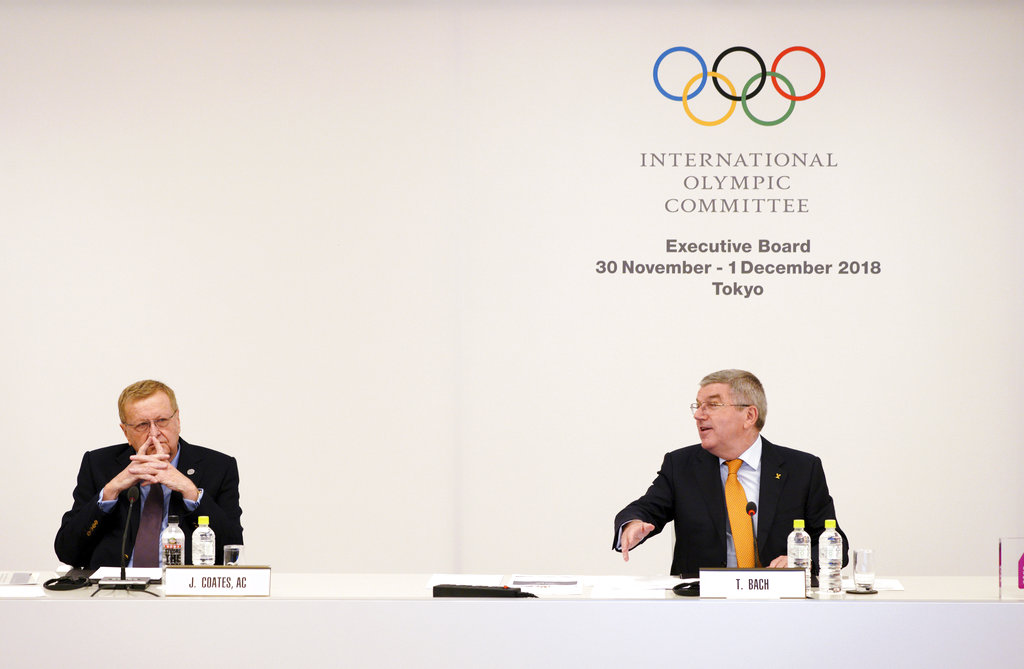Bach and IOC: No Olympic city ever as ready as Tokyo

International Olympic Committee (IOC) President Thomas Bach, right, gestures to John Coates, left, chairman of the IOC Coordination Commission for the 2020 Tokyo Olympics and Paralympics, shake hands prior to an IOC Executive Board meeting Saturday, Dec. 1, 2018, in Tokyo. The IOC said boxing will take place at the 2020 Tokyo Olympics. But exactly who runs the tournament and the details of qualifying are up in the air because of charges of corruption and malfeasance surrounding the boxing federation that runs the sport at the Olympics. (AP Photo/Eugene Hoshiko)
TOKYO — IOC President Thomas Bach and other International Olympic Committee members are calling Tokyo the best prepared host city in memory.
Still, there are obstacles ahead for the 2020 Games, though small by the standards of the corruption-plagued Rio de Janeiro Olympics in 2016.
John Coates, the head of an IOC inspection team, wrapped up three days of meetings in Tokyo on Wednesday and said the city’s summer heat is a growing worry.
Organizers are proposing to start the marathon between 5:30-6 a.m., and have moved up morning rugby matches by 90 minutes to play in the cooler air. Mountain biking will be contested later in the afternoon for the same reason.
Organizers are also struggling to keep the 600 billion yen (about $5.3 billion) operating budget balanced with heat-related solutions driving up costs.
This is the privately-funded budget for running the games themselves and separate from billions more that governments are spending to prepare the city.
“The organizing committee and the people of Japan remain on track to deliver spectacular Olympic and Paralympic Games,” Coates said.
Yoshiro Mori, the president of organizing committee, was sitting alongside and was cautious about the plaudits.
“We should not be overconfident about such praise,” he said through an interpreter. “We still should buckle down very firmly … They praise us, they give us a good report card. But in addition to that I want to be better.”
This summer’s scorching Tokyo heat nudged 40 degrees C (104 degrees F) several times and is running up costs and concerns.
Coates said an IOC panel had studied the problem and called this summer “abnormal.”
“It will continue to be at the front of our minds for us and the organizers,” Coates said. “We will do everything possible to insure that they (athletes) are not competing at risk — or watching at risk.”
Coates said organizers are preparing more cooling light-water sprays, reflective pavement for the running courses, and more shade for fans.
“It’s those sorts of things,” Coates said. “There’s a list of about 20 precautions they think we should take, and they’re not going to be free.”
Coates said those and other costs were stressing the operating budget. The third version of that budget will be presented on Dec. 21.
“My confidence is that there will be a balanced subject, subject to there being nothing massively untoward,” Coates said.
Several months ago, Coates contrasted Tokyo with Rio de Janeiro.
“In Rio we didn’t know who was paying what — if at all,” he said.
Tokyo’s privately-funded operating budget of $5.3 billion derives income from the IOC, domestic sponsorship sales, merchandise sales and ticket sales.
The largest chunk of income is from domestic sponsorship sales, which have reached about $3 billion. Coates and Bach said the enthusiasm of Japanese companies had helped smash all records.
Still, Coates said about $100 million more was needed to meet budget requirements.
Coates said he was hopeful “there won’t be any drain on the public purse.”
Despite the wealth of private money, public money is still the backbone of the Tokyo Olympics.
The national government’s Board of Audit spelled out total Olympic costs in a 178-page report published in October. It forecasts total spending to prepare the Olympics at about $20 billion. That includes the private operating budget.
The rest comes from the national government, Tokyo city government and other local governments — meaning about 75 percent of the funding is taxpayer money.
This reality contrasts sharply with Tokyo’s winning bid in 2013, which projected overall Olympics costs of 829 billion yen ($7.3 billion).
Tokyo organizers and the IOC dispute what are — and what are not — Olympic costs. It’s complicated. Some projects might have been built without the Olympics and are not clearly related. Others are driven directly by the requirements of hosting the games.
Stung by criticism of forcing cities to build white elephant venues, the IOC is saying the upcoming Olympics in Paris (2024) and Los Angeles (2028) will rely heavily on existing venues. The same is true for the two bids for the 2026 Winter Olympics: Stockholm, Sweden, and the Italian bid of Milan-Cortina.
The outlier is the 2022 Winter Olympics in Beijing. The Chinese capital spent at least $40 billion on the 2008 Summer Olympics. Bach and the IOC have cautioned China to keep the costs down.
Also, the Tokyo city government said a 51-year-old man died Wednesday after falling from the 12th floor of a building under construction at the athletes village in the bay area of Tokyo. He was Japanese, but his name has not been released.